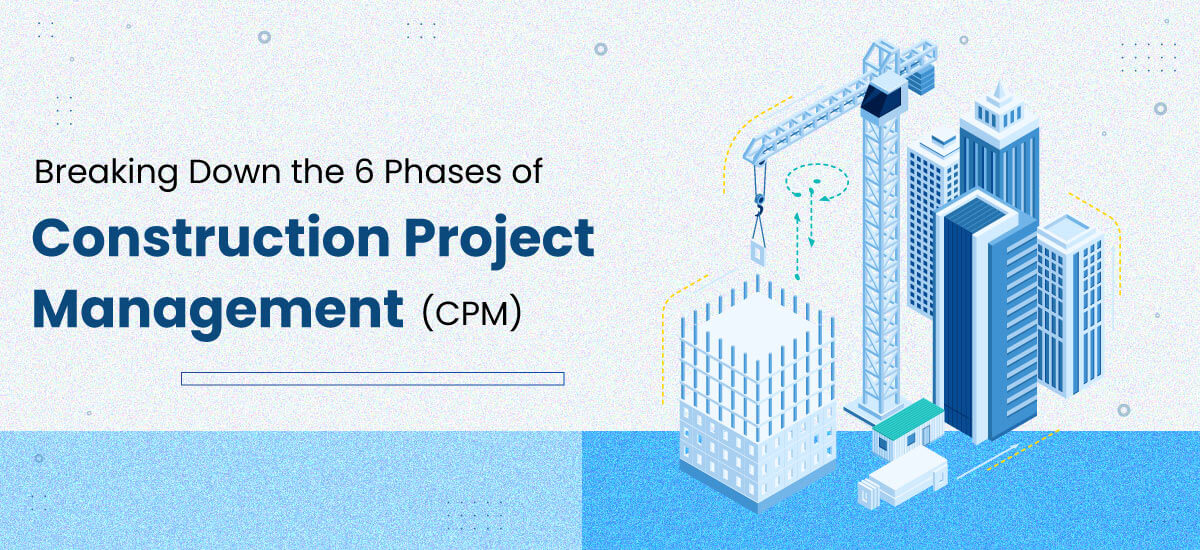Table of Contents
Are you tired of managing construction projects that go over budget and behind schedule?
So, grab a cup of coffee and dive into our blog post now to learn how to effectively manage your next construction project!
Construction Project Management (CPM) is a complex and challenging process that requires careful planning, execution, and monitoring. Effective management of a construction project can help you ensure that it is completed on time, within budget, and to the highest possible standards. To achieve this, it is essential to understand the six phases of Construction Project Management.
What is Construction Project Management (CPM)?
Construction project management (CPM) is a process that involves planning, coordinating, and overseeing construction projects from start to finish. The goal of CPM is to ensure that the project is completed on time, within budget, and to the required quality standards. It involves managing various aspects of the project, including budgeting, scheduling, resource allocation, risk management, and quality control.
A construction project manager is responsible for overseeing the entire project and ensuring that all stakeholders are informed of progress and potential issues. CPM is essential for ensuring the success of any construction project, from small renovations to large-scale infrastructure projects.
6 Phases of Construction Project Management
In this blog post, we will break down each phase and highlight its significance in ensuring a successful construction project.
Phase 1: Project Conception and Initiation
The first phase of CPM involves project conception and initiation. This phase begins with the identification of the need for a construction project and the formulation of a project idea. It also involves the establishment of project goals, objectives, and scope, and the identification of potential risks, challenges, and opportunities. At this stage, a feasibility study is often conducted to determine the viability of the project and its potential impact on the environment and community.
Phase 2: Planning and Design
The planning and design phase is critical to the success of any construction project. This phase involves the development of a comprehensive project plan that outlines the scope, schedule, budget, and resources required to complete the project. The project design is also developed during this phase, and it involves the creation of detailed drawings, schematics, and blueprints that will guide the construction process. It is also important to ensure that the project complies with all applicable regulations, standards, and codes.
Phase 3: Procurement and Contracting
The procurement and contracting phase involve the selection of contractors, vendors, and suppliers who will provide the materials, equipment, and labor required for the construction project. Contracts are also negotiated, reviewed, and finalized during this phase. Effective procurement and contracting are critical to the success of the construction project, as it ensures that the right resources are available at the right time and at the right price.
Phase 4: Construction Execution
The construction execution phase is where the project comes to life. This phase involves the actual construction of the project as per the project plan and design. It is essential to ensure that the construction process is managed effectively, and that all safety, quality, and environmental standards are met. Close monitoring and supervision are required during this phase to ensure that the project is progressing as per schedule and within budget.
Phase 5: Monitoring and Control
The monitoring and control phase involves the regular review of the project’s progress against the project plan. This phase helps to identify any deviations from the plan and allows for corrective action to be taken. It is essential to keep stakeholders informed about the project’s progress and any changes to the project plan. This phase also involves effective communication with stakeholders to ensure that they are aware of any potential risks or issues that may arise during the construction process.
Phase 6: Project Closeout
The project closeout phase is the final stage of CPM, and it involves the completion and handover of the project to the client. This phase involves the final inspection of the project, resolution of any outstanding issues, and the documentation of the project’s completion. It is also important to obtain feedback from the client about their satisfaction with the project and to identify any areas for improvement.
Tools You Need to Run a Successful Construction Project
Running a successful construction project can be a complex task, but with the right tools and technology, it can be made simpler and more efficient.
Yoroflow offers a suite of tools that can help you manage every aspect of your construction project, from planning and scheduling to communication and collaboration.
Here are some of the essential tools from Yoroflow that you need to run a successful construction project:
- Yoroproject: Yoroproject is a powerful project management software that can help you plan, organize, and track your construction project from start to finish. It allows you to manage tasks, timelines, resources, and budgets in real-time, and collaborate with your team members on a single platform.
- YoroCRM: Customer relationship management is important in any business, and the construction industry is no exception. YoroCRM allows you to manage customer interactions, track leads, and maintain communication with your clients, ensuring that your project is aligned with their needs and expectations.
By using these, you can streamline your workflow, manage your finances, and ensure that your project is aligned with your clients’ needs and expectations.
Wind Up
Construction Project Management is a complex process that involves many interrelated phases. Effective management of a construction project requires careful planning, execution, and monitoring of each phase. By breaking down the six phases of CPM, we hope to provide you with a better understanding of the process and its significance in ensuring a successful construction project.
With careful planning, effective communication, and close monitoring, you can ensure that your construction project is completed on time, within budget, and to the highest possible standards.




